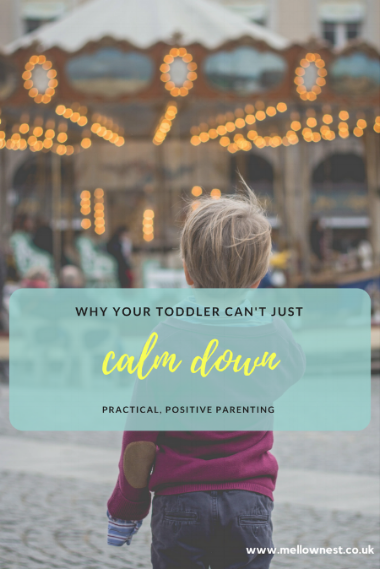Why your toddler can't just calm down
It was the end of the day when my two-year old asked for a biscuit.
I was tired, cooking dinner and not in the mood for a showdown.
I offered a small piece of fruit as usual and explained that dinner was on the way.
Normally a successful strategy, I wasn’t prepared for her response.
Full. Body. Tantrum.
Screaming, kicking, the whole nine yards.
I felt a flash of fury.
Couldn’t she see I was just trying to get this done? Couldn’t I just get ten minutes?
If you’ve been there too, I won’t tell you to calm down.
As a wise person once said, ‘No one has ever calmed down from being told to do so’ (Actually, I think it was a guy on Twitter but he’s pretty much on the money).
Instead, I’ll let you in on some well-kept toddler secrets that I have to remind myself of at times.
Tantrums are developmentally normal.
Tantrums help get big feelings out.
And the most important one?
Children sometimes ask for what they need in very unhelpful ways.
These are the things I remind myself when I feel like I’m about to lose my mind.
Because I know that a tantrum isn’t just a bit of naughty behaviour.
It’s a whole-body event; a neurological and physiological reaction to the happenings in their world at that moment.
A tantrum is a child’s version of the ‘flight or fight’ response.
This ancient response is deeply embedded in every person’s brain, and when triggered it unleashes a cascade of stress hormones into the body.
The point of this response you ask?
Survival. When a person feels under stress this response focuses all their efforts on fighting or getting away from the source of distress.
Cue lashing out, tears, screaming and running away.
Even when it’s just a biscuit.
Things that seem trivial to us are a big deal to them
You experience fight or flight responses too. It just looks different.
Common adult responses to stress include withdrawing, verbally lashing out, becoming anxious or crying. In the long term, responses might even begin to manifest in other unhelpful behaviours like smoking, overeating or drinking alcohol.
Or, hopefully, you might have learned how to keep your cool when stress hits (at least some of the time).
As adults, we have more available brain capacity and have had more opportunities to practise managing our survival responses. In a stressful situation, while we experience the desire to fight or run away, we have learned how to take few seconds and some deep breaths before tackling the issue.
A child has had far less practise and hasn’t developmentally matured some of the more advanced areas of the brain yet.
But here's the really important bit: sometimes they get stuck in the response and need your help to get out.
You might feel like shouting at them or telling them to calm down but neither of these responses will have the desired effect.
In the midst of a tantrum saying much more than an empathetic murmur is wasted breath.
RELATED POSTS:
HOW TO END CONTROL BATTLES WITH YOUR CHILD
TEN SIMPLE TIPS TO DEAL WITH TODDLER TANTRUMS
What your child needs is your physical presence and, when they’re ready, your comforting touch.
Perhaps what they need most of all from you is an understanding that these feelings are normal and acceptable.
That doesn’t mean you need to give them the biscuit; it just means engaging your empathy to let them know you understand that they wish they could have it.
Learning that anger and sadness aren’t to be feared early in life can serve as a great gift to our children. As you weather the storm with them and bring them back to a feeling of safety they begin to internalise this resilience. In fact you can read more about how important that is in this blog post: the parenting message you didn't mean to send.
The hard part?
Managing your own feelings in response to their behaviour.
No easy matter for tired, busy, stressed out parents. Separating your own triggered feelings from your child’s takes practice.
Lots of it.
When I step back from the situation and engage my rational brain I can see that the tantrum probably wasn’t about the biscuit. If she had just been hungry she’d have taken the fruit.
It had been a long day, we were both a little tired and fractious and if I had to guess, the tantrum was really a bid for attention and a need to get some of those unpleasant feelings out.
My husband came home to find us both sitting on the kitchen floor. Her red-eyed but calm in my lap.
We had take-out.
Who are Mellownest anyway?
We're Claire and Nneka.
You might be wondering whether we're worth listening to - after all, we don't know your family.
But we do know a lot about psychology, child development and how little brains work.
As a qualified psychologist and emotional wellbeing expert we've helped hundreds of families to adjust their mindsets, learn new tools and have more fun!



